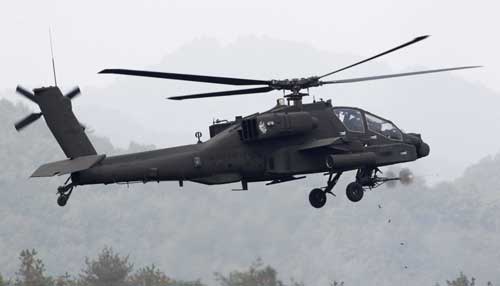U.S., ROK drills begin as experts meet
 |
|
A United States AH-64 Apache helicopter fires from its machine gun turret during an aerial gunnery training exercise at the US Army's Rodriguez Range in Pocheon. |
The Republic of Korea (ROK) began its participation on Wednesday in a United States-led coalition exercise to intercept ships suspected of transporting weapons of mass destruction, risking the anger of rival Democratic People's Republic of Korea (DPRK), one of the countries targeted by the program.
A United States AH-64 Apache helicopter fires from its machine gun turret during an aerial gunnery training exercise at the US Army's Rodriguez Range in Pocheon, about 15 km south of the demilitarized zone separating the DPRK and ROK. [Photo/Agencies]
The DPRK has long warned it would consider Seoul's participation in the Proliferation Security Initiative as a declaration of war against the DPRK.
The ROK was hosting a seminar on Wednesday among 15 participating nations in the southeastern city of Busan, to be followed on Thursday with naval interdiction drills involving the ROK, the US, Australia and Japan in international waters between the ROK and Japan, the Defense Ministry said.
The program, which began in 2003, has been joined by more than 90 countries to help deter trade in weapons of mass destruction and missiles by states including the DPRK and Iran. Seoul said last year it was joining the maritime web after Pyongyang conducted its second atomic test.
The drills also come amid lingering tensions on the divided Korean Peninsula following the deadly March sinking of an ROK warship blamed on Pyongyang.
In May, a multinational investigation led by Seoul concluded that a torpedo fired from a DPRK submarine sank the 1,200-ton warship. Pyongyang has denied involvement in the sinking that killed 46 ROK sailors.
The sinking has dimmed the prospects for resuming the stalled Six-Party Talks aimed at dismantling DPRK's nuclear programs. The DPRK quit the talks last year, but it has expressed willingness to rejoin the talks, which include the US, ROK, China, Japan and Russia.
Seoul and Washington have said Pyongyang must first take specific moves to demonstrate its sincerity.
In Beijing, Chinese nuclear envoy Wu Dawei told reporters on Tuesday after his meeting with the DPRK's First Vice-Foreign Minister Kim Kye-gwan that Pyongyang appeared to have a positive stance in resuming the nuclear talks, ROK's Yonhap news agency reported on Wednesday.
Kim, who served as the DPRK's top nuclear envoy, was promoted last month from vice-foreign minister.
 0
0 







Go to Forum >>0 Comments